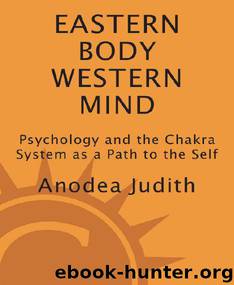Eastern Body, Western Mind: Psychology and the Chakra System As a Path to the Self by Judith Anodea

Author:Judith, Anodea [Judith, Anodea]
Language: eng
Format: mobi
Published: 0101-01-01T00:00:00+00:00
It is not so much the
parent alone that is
internalized, as it is the
relationship between the
parent and the child.
KEN WILBER
When Alex was about five, he
came down with a stomach u
that kept him in bed for a few
days. As he was sick to his
stomach, I was not about to
force him to eat, but wanted
him to have nourishment if he
wanted it. So I prepared some
toast, left it on a plate next to
his bed, and tucked him in with
his teddy bear. He soon
recovered and the incident was
forgotten. A few weeks later,
when I was taking an
afternoon nap, I woke to find a
plate of awkwardly buttered
toast placed on my night table
and a teddy bear on the pillow
next to me. This was a true
sign he was in the heart chakra
stage.
The
fourth
chakra
developmental stage begins
when the child moves from the
intense
egocentricity
and
willfulness of the third chakra
into a readiness to meet and
cooperate with others. This
generally begins between three
and four years, after autonomy
and basic impulse control have
been established. It may
happen suddenly, when the
seemingly impossible child
spontaneously does something
sweet and kind for someone
else. A child may also swing
back to stubborn willfulness at
three-and-a-half before nally
moving on to the more loving
and harmonious heart chakra
stage at around four years. In
the uncertainty of new
behavior, a child often runs
back to familiar patterns for
security. Development is not
always smooth.
As we climb further up the
chakras, the exact timing of the
developmental stages becomes
less speci c. It depends in part
on the successful resolution of
previous stages, which varies
from case to case, and the
variations widen as we get
higher. Unfortunately, many
people do not reach the upper
chakra stages at all, or do so
only later in life. Therefore, we
will now begin to discuss both
childhood
and
adult
development.
In childhood, fourth chakra
development
marks
the
formation of our social identity,
also known as the persona.
This is the aspect of self that
we create to win love, gain
social approval, and get along
in the larger world. In the
fourth chakra we no longer see
the world entirely in terms of
our own needs, and so our
relationships expand from
being speci cally one-on-one
(i.e., child and mother, child
and father) to include larger
family and social structures.
The child now nds that she is
part of Mommy and Daddy’s
relationship with each other,
and that she has brothers and
sisters, classmates, neighbors,
and friends of her own.
The verbal messages that
were internalized during the
third chakra stage centered
around action and behavior.
Now in the fourth chakra stage
it
is
the
parent-child
relationship itself that becomes
internalized. It is not only the
messages Dad continually gives
us about being noisy in the
house, but also the context of
Dad’s relationship with us that
becomes important. If the
message was given in the
context of fear, we feel fear
along with the internalized
message. How we behave and
who we become is shaped by
the way we internalize our
basic family relationships.
Eric Berne outlined these
internal relationships in his
theories
of
transactional
analysis, which describes how
we operate from internalized
parent, adult, or child scripts.
If we rebel against Dad’s
messages, we are playing the
script of the naughty child with
a critical parent, and aspects of
it become part of our internal
dialogue. Throughout life, we
may
nd
both
roles
simultaneously clamoring for
the driver’s seat, as sometimes
we will be led by rebellious
urges, while at others we will
be held back by our inner
critic. We also repeat these
relationships with others. If a
friend criticizes you, they may
suddenly become your critical
parent. Then you nd yourself
reacting like a naughty child,
instead of listening to what
they have to say.
Download
This site does not store any files on its server. We only index and link to content provided by other sites. Please contact the content providers to delete copyright contents if any and email us, we'll remove relevant links or contents immediately.
| Acupuncture & Acupressure | Aromatherapy |
| Ayurveda | Chelation |
| Chinese Medicine | Energy Healing |
| Healing | Herbal Remedies |
| Holistic | Homeopathy |
| Hypnotherapy | Massage |
| Meditation | Naturopathy |
| Reference |
Inner Engineering: A Yogi's Guide to Joy by Sadhguru(6797)
The Power of Now: A Guide to Spiritual Enlightenment by Eckhart Tolle(5788)
Fear by Osho(4741)
Ikigai by Héctor García & Francesc Miralles(4276)
The Art of Happiness by The Dalai Lama(4132)
The Ultimate Bodybuilding Cookbook by Kendall Lou Schmidt(3946)
Yoga Therapy by Mark Stephens(3749)
The Little Book of Hygge by Meik Wiking(3695)
The Healing Self by Deepak Chopra(3583)
Why Buddhism is True by Robert Wright(3455)
The Hatha Yoga Pradipika (Translated) by Svatmarama(3344)
Being Aware of Being Aware by Rupert Spira(3278)
Shift into Freedom by Loch Kelly(3199)
Wild Words from Wild Women by Stephens Autumn(3155)
Work Clean by Dan Charnas(3124)
Happiness by Matthieu Ricard(3050)
More Language of Letting Go: 366 New Daily Meditations by Melody Beattie(3030)
Yoga Body & Mind Handbook by Jasmine Tarkeshi(2880)
Why I Am Not a Feminist by Jessa Crispin(2761)
